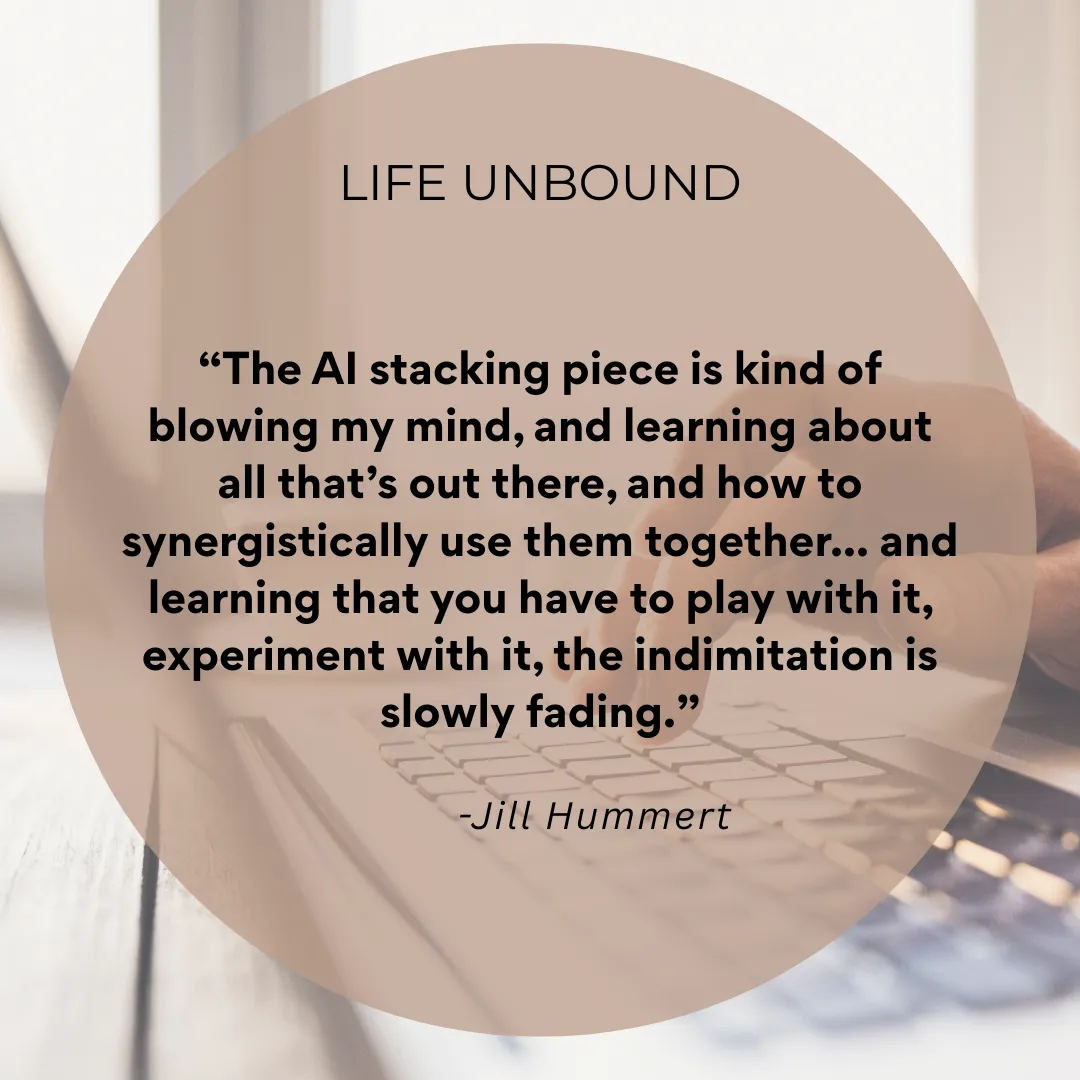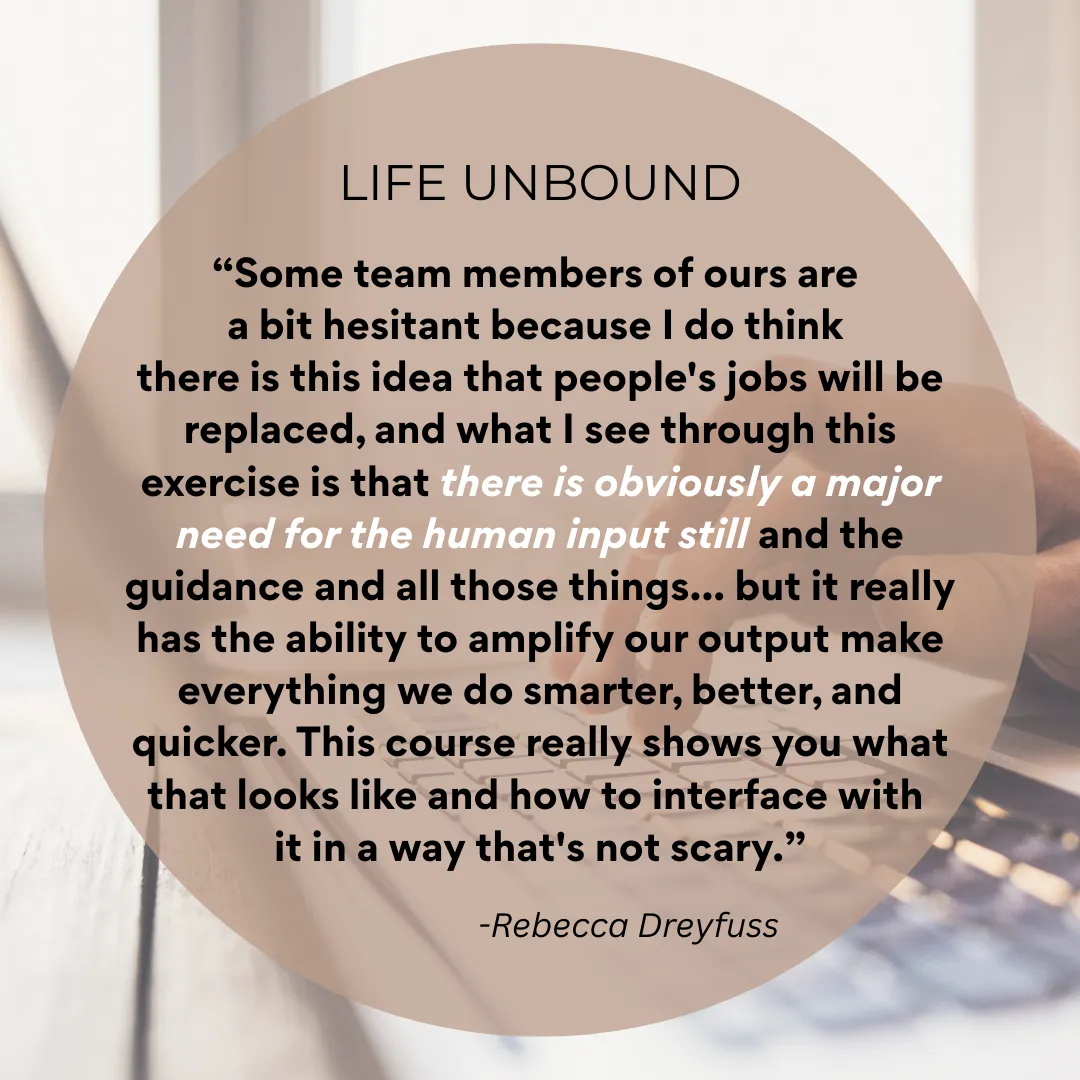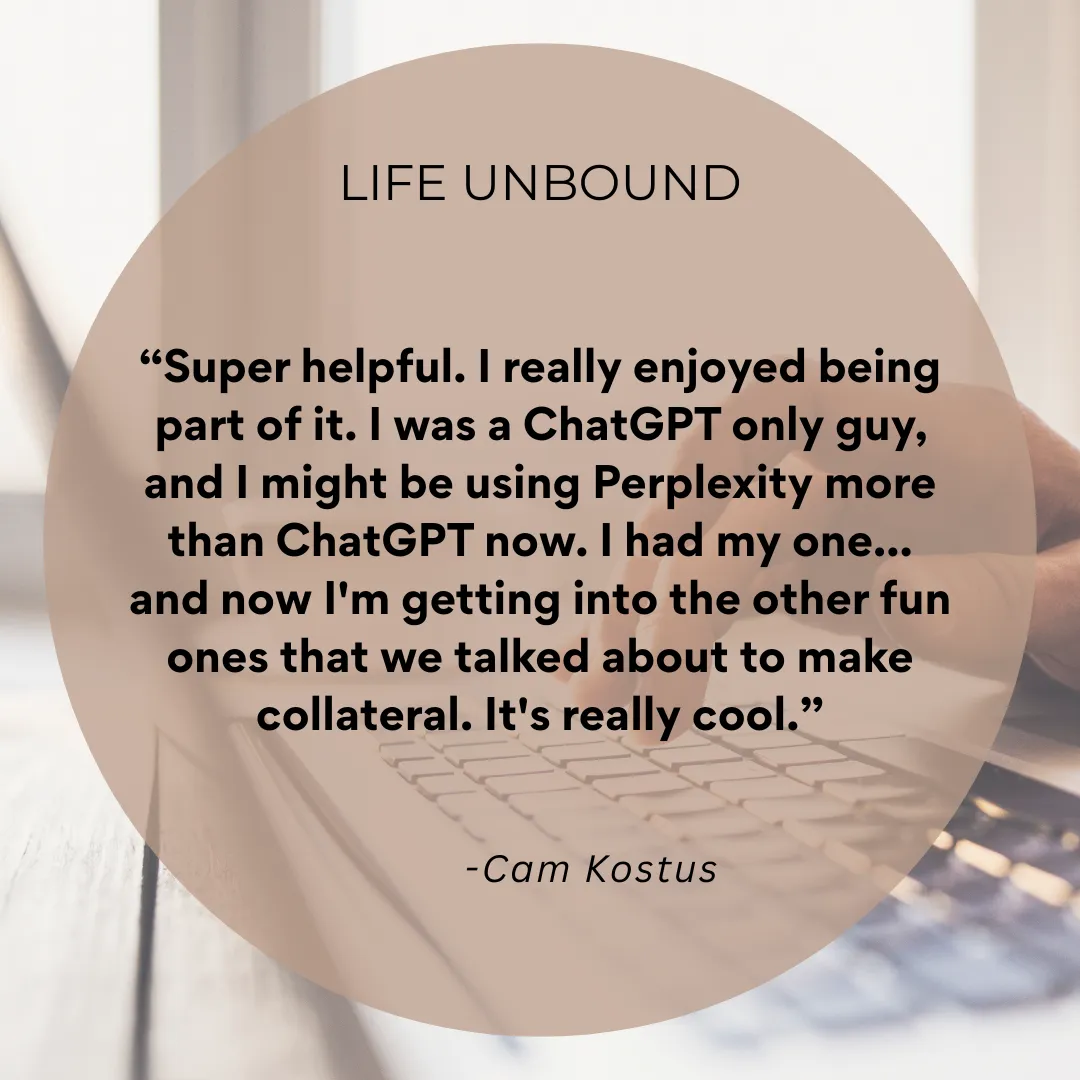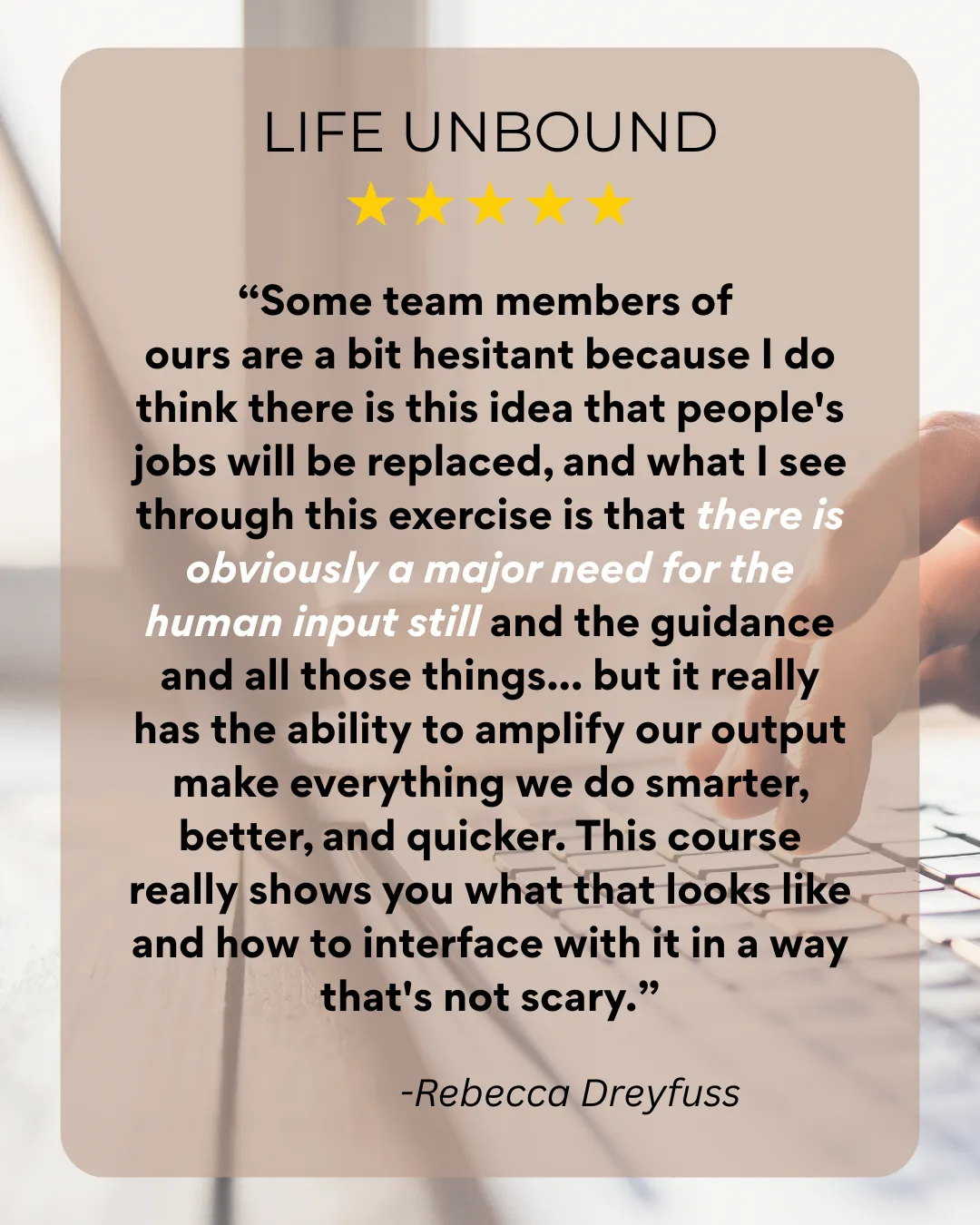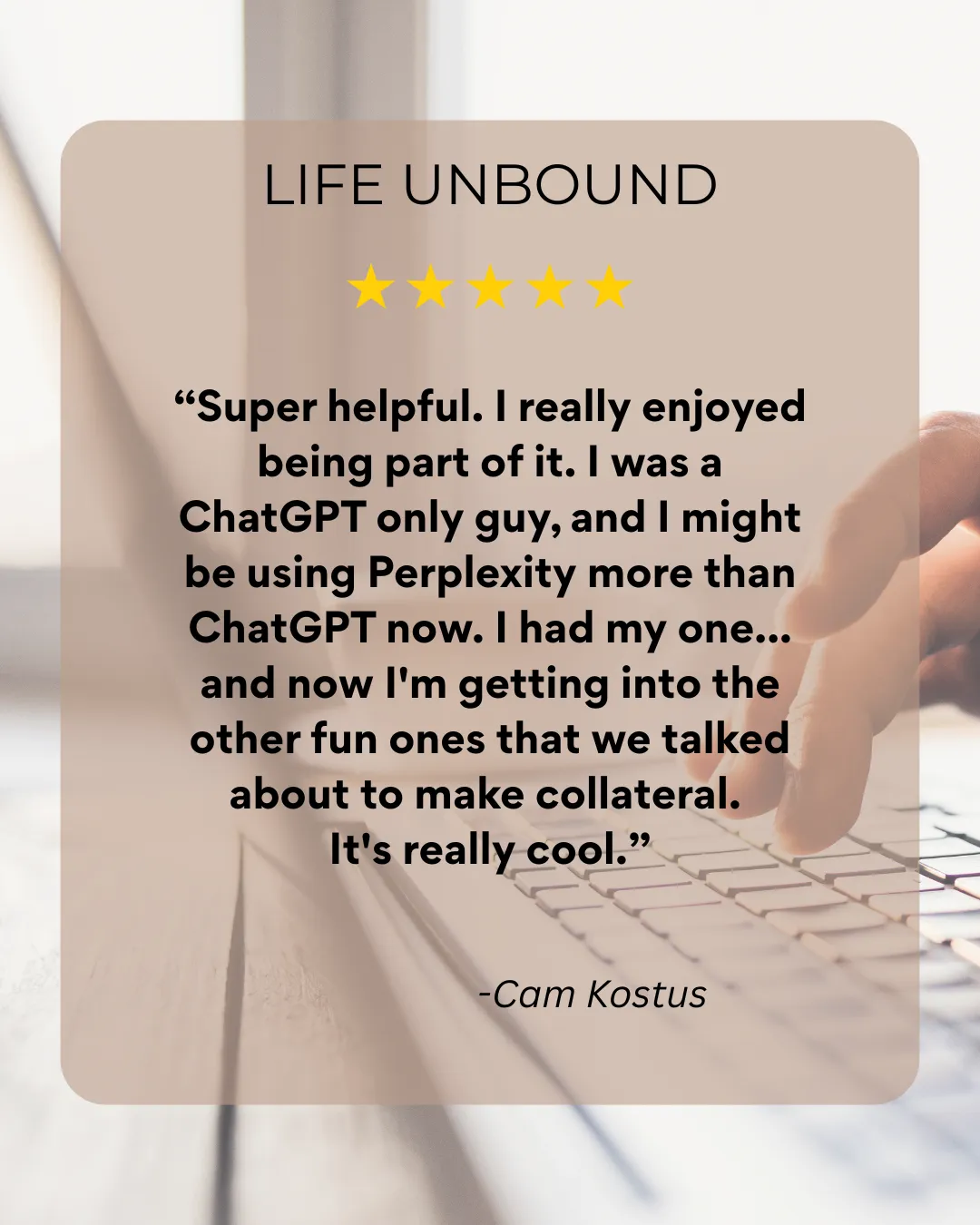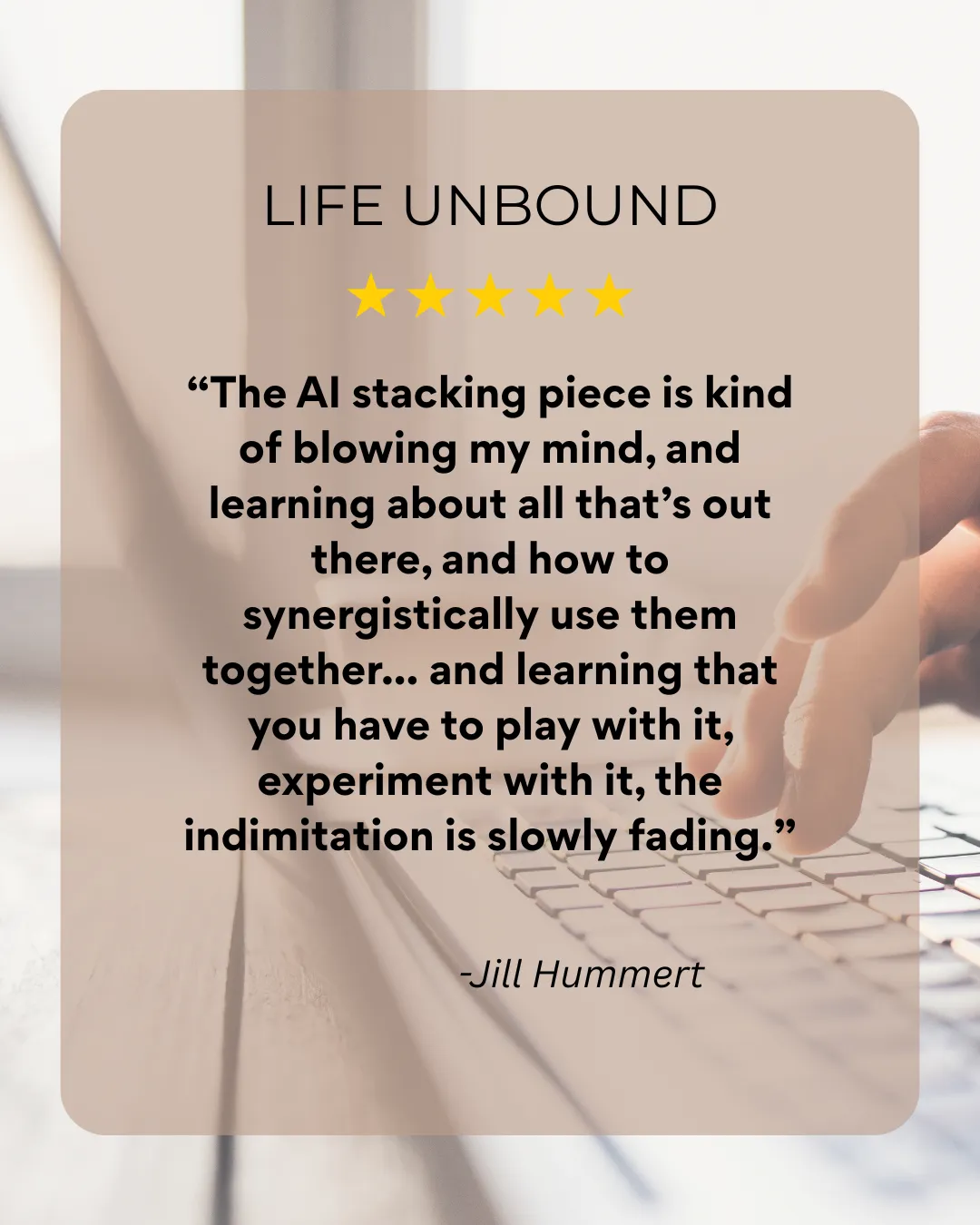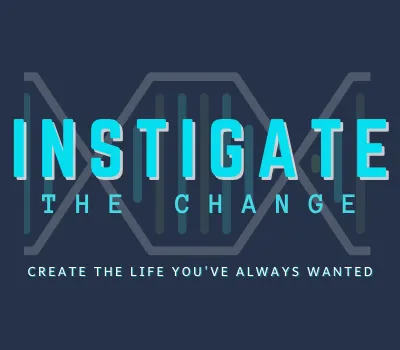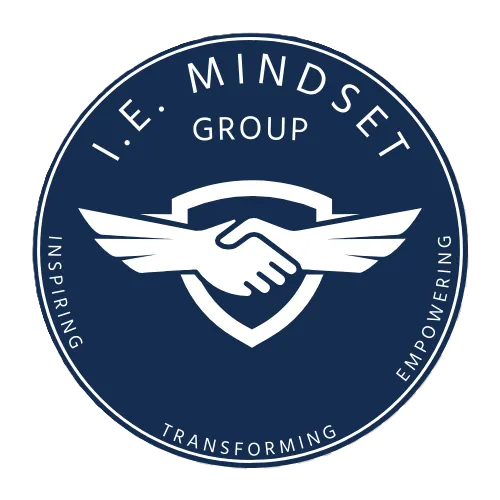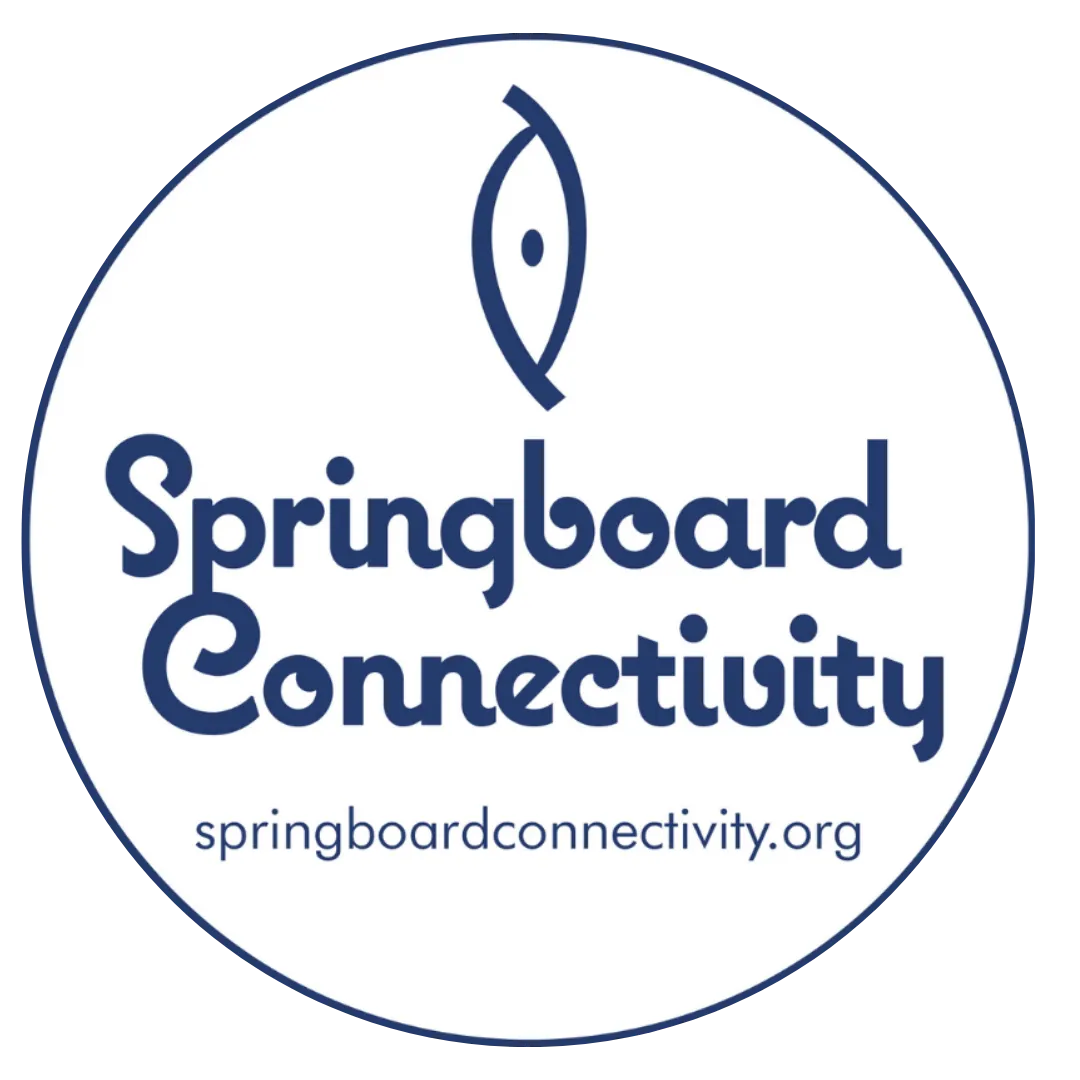UNBOUND
BREAKING BARRIERS,
BUILDING FUTURES
Grow your career. Empowered by AI. Rooted in Wellbeing
We offer education and resources to help women and organizations
navigate emerging tech and build meaningful
success — without trading health, connection, or purpose.
UNBOUND
BREAKING BARRIERS,
BUILDING FUTURES
Grow your career. Empowered by AI.
Rooted in Wellbeing.
We offer education and resources to help women and organizations navigate emerging tech and build meaningful success — without trading health, connection, or purpose.
What We Offer
SElf-paced Courses and Resources
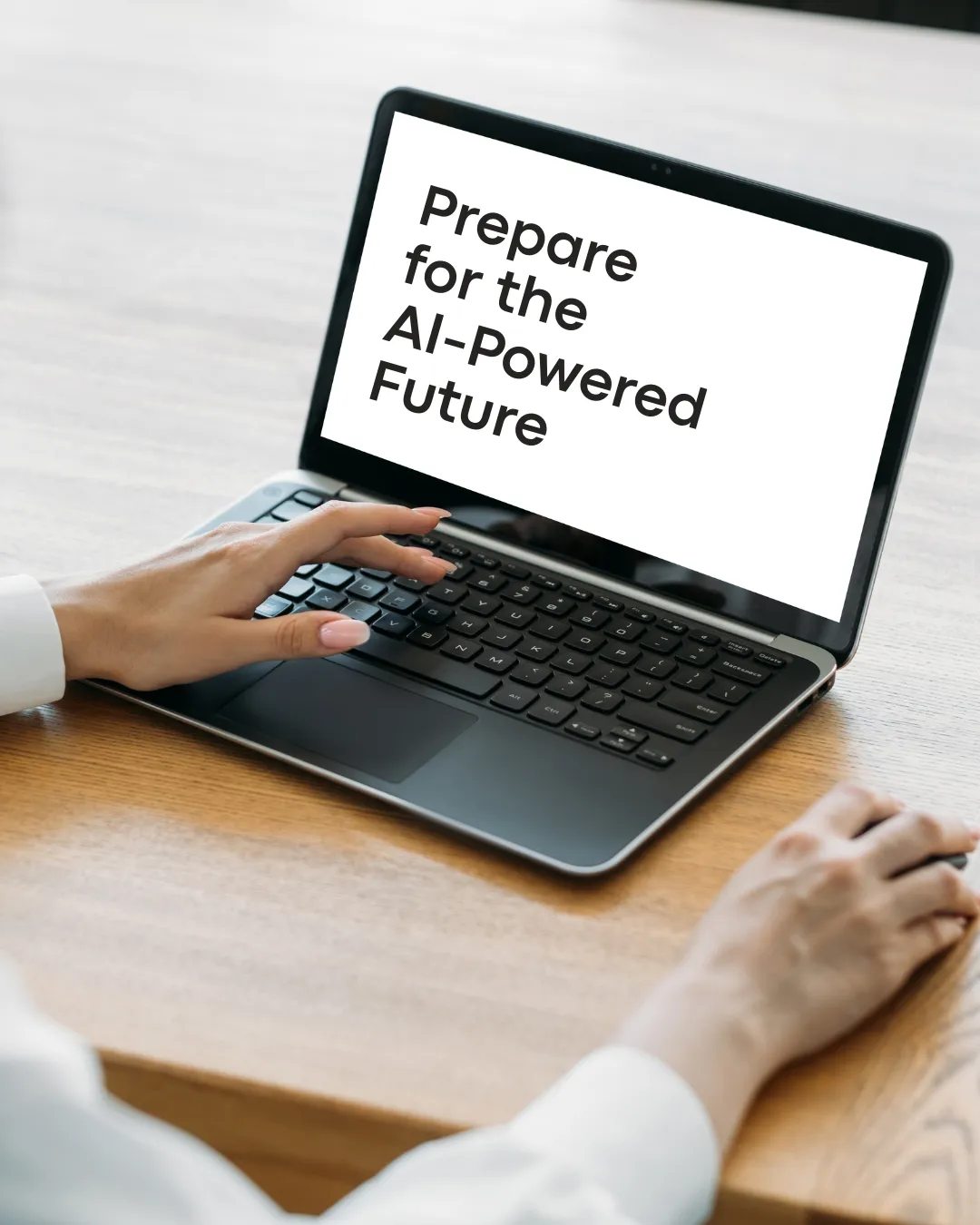
Assessments, Tools, Blog, Courses and Ebooks! See below
Live virtual
AI courses

See Below to Sign up for our Next Course!
Custom trainings For your teams

Schedule a Meeting to Review your Specific Needs!
Whats Your #1 Career Growth Challenge?
Take Your FREE Assessment Here to see whats holding you back and what you can do about it!
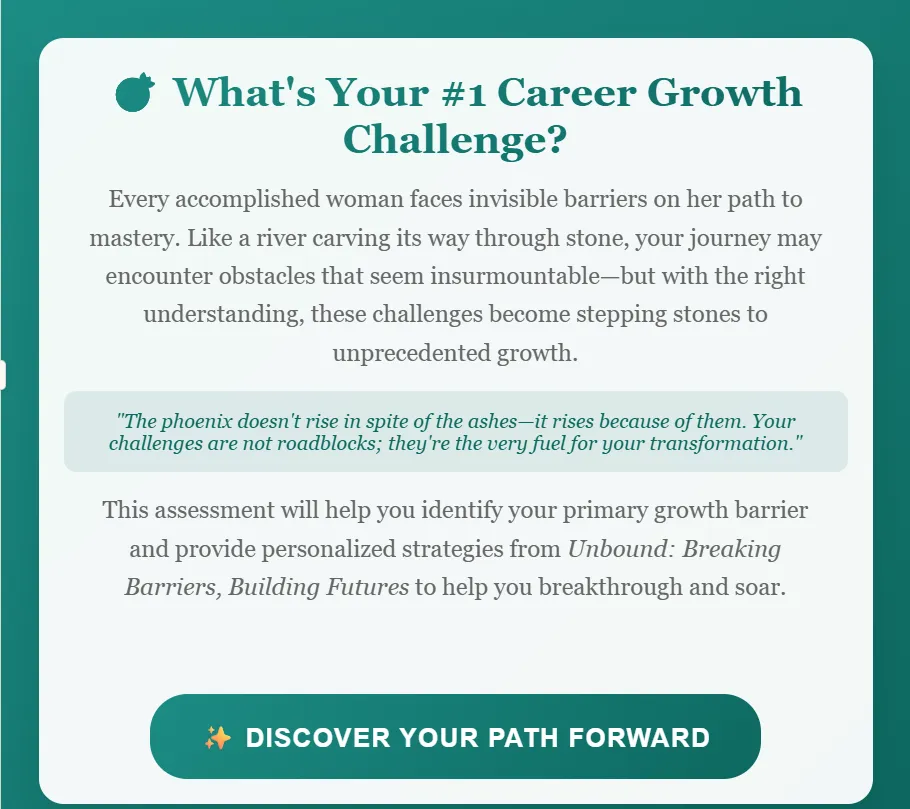
Features and Benefits
NAVIGATE THE AI LANDSCAPE
Navigate digital transformation and AI to advance rather than hinder your career
FIND YOUR VOICE
Discover your authentic leadership voice and build unshakable confidence
BUILD YOUR BRAND
Develop a compelling personal brand that opens doors to new opportunities
NEGOTIATE LIKE A PRO
Master the art of strategic self-advocacy without compromising your values
BOUNDARY MANAGEMENT
Create boundaries that protect your energy while enhancing your impact
VALUE ALIGNED SUCCESS
Define success on your own terms, creating a path aligned with your deepest values
build your network
How to develop the relationships that amplify your voice, expand your opportunities, and accelerate your impact.
leadership presence
How to embody your authentic authority in ways that create meaningful impact while remaining true to your core values and identity.
work life balance
Learn to manage your energy, aligned with your values and purpose to build a life in balance
Upcoming Courses
The AI Leverage Foundation
August 2025
Are you ready to unlock your AI skills?
Join a guided experience where you’ll learn to build your own AI toolkit, simplify your workflow, and make AI a supportive part of your life or business.
Just smart strategy, aligned tools, and personal guidance to help you feel capable—not behind.
Ebooks COMING SOON
2025!!
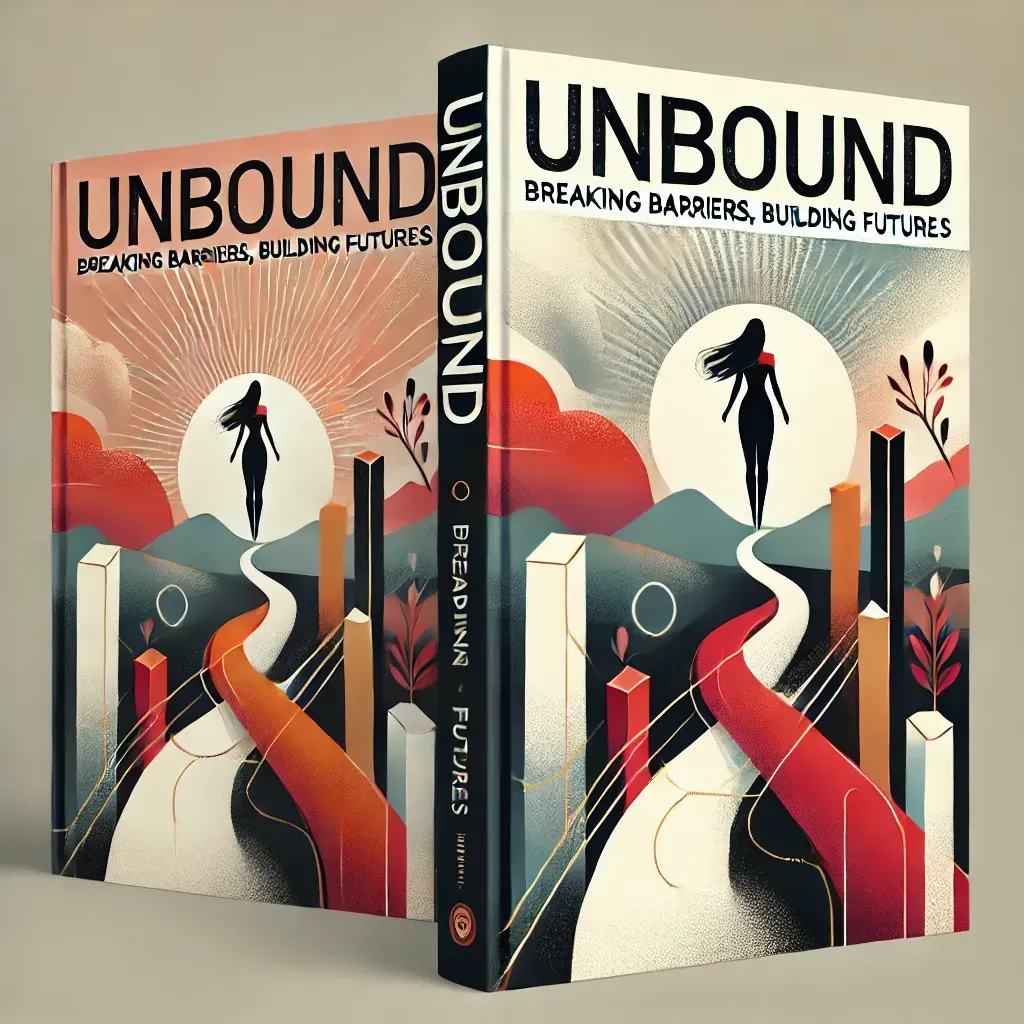
Find Your Authentic Path to Success
In a world where women continue to navigate unique challenges in the workplace, "Unbound" byy Amie Rafter, offers a transformative roadmap for professional advancement on your own terms
This isn't just another career guide—it's a comprehensive companion that blends cutting-edge research with practical wisdom to address the specific obstacles women face, from imposter syndrome to visibility gaps, negotiation challenges to work-life boundaries.
Whether you're launching your career, pushing through the middle management barrier, or aiming for the C-suite, this book provides the tools to transform challenges and live your purpose and potential,
MEET THE FOUNDER & CEO
Amie Rafter
Founder Amie Rafter is a seasoned professional with a diverse background in business, leadership and personal development. She holds an MBA and BS in International Business, spent 24 years in the tech and medical device corporate world and 5 years in non-profit, prior to starting her own business supporting entreprenuers with practical launch strategies. Her combined experience in strategic sales, leadership, along with being a life, career coach, yoga teacher and most importantly, mother, has given her a unique set of tools and capacity to offer holistic support to women.
Amie developed the Unbound model and platform after both experiencing and seeing the challenges women face every day both as entrepreneurs and leaders. She understands that the unique energy and intentions women bring are designed to support the world in the ways we need now and she wants to scale that energy, removing traditional obstacles for her clients and companies.

Blog

The AI Effect: How Generative Tools Are Reshaping Women’s Minds, Work, and Confidence
A New Layer to Cognitive Overload
A year ago, I was a high-functioning professional—sharp, efficient, and able to juggle multiple projects at once. But something shifted as I built my business. My once-reliable memory began failing me. I’d forget names, appointments, even ideas that had come to me moments before. I felt increasingly scattered, as if my brain were being pulled in multiple directions at once. And worst of all, a nagging sense of imposter syndrome crept in, making me question whether I was truly capable of leading in this new, AI-driven world.
At first, I chalked it up to turning 50—hormonal changes, perimenopause, the inevitable slowing down. But as I looked closer, I realized something more nuanced was at play. My cognitive decline seemed eerily aligned with my increased reliance on AI. Generative tools were making me more productive, sure, but were they also quietly atrophying my ability to think, recall, and execute?
The more I talked to other women, the more I realized I wasn’t alone. Was this a technological side effect we hadn’t anticipated? Could generative AI be subtly eroding the cognitive and emotional strengths women have long relied upon to navigate their careers and lives?
Defining Key Concepts
To understand the impact of AI on cognition, let’s first define some key terms:
Cognitive Offloading: The process of relying on external tools (like AI, GPS, or search engines) to store and process information, reducing our need to engage in deep thinking. Nicholas Carr’s The Shallows: What the Internet Is Doing to Our Brains explores this phenomenon in depth.
Imposter Syndrome: A psychological pattern in which individuals doubt their accomplishments and fear being exposed as a fraud, disproportionately affecting women and minorities (Valerie Young, The Secret Thoughts of Successful Women).
Attention Economy: A system where businesses profit from capturing and holding human attention, often leading to cognitive fragmentation and reduced focus (Adam Alter, Irresistible: The Rise of Addictive Technology).
Cognitive Offloading: When AI Thinks for You
Generative AI is designed to make our lives easier. It drafts emails, brainstorms ideas, writes presentations, and even suggests responses in conversations. It’s the ultimate cognitive assistant. But here’s the paradox: the more we delegate thinking to AI, the less we engage in the cognitive effort that keeps our minds sharp.
This phenomenon, known as cognitive offloading, isn’t new. GPS has weakened our ability to navigate (studies on spatial navigation loss), and calculators have dulled our mental math. But generative AI takes this further by replacing complex reasoning and creativity. For women, who already battle credibility gaps in professional spaces, this could have profound consequences. If AI-generated content replaces our own original thought, do we risk feeling even less ownership over our ideas?
The AI-Imposter Syndrome Connection
Women disproportionately suffer from imposter syndrome, the persistent belief that one’s success is unearned. AI tools, by making content creation seamless, can reinforce this self-doubt. If an AI refines our writing, improves our strategy, or automates a key decision, we might start questioning: Was that really me, or was it the AI?
This dynamic can be especially insidious in industries where women already struggle for legitimacy. Studies on the “confidence gap” suggest that women tend to underestimate their abilities compared to men (Valerie Young). If a woman’s polished work is the product of AI assistance, will she feel less confident in her expertise? Will male colleagues, less inclined to question their competence, experience the same self-doubt? The risk isn’t just personal—it’s systemic. AI could deepen existing gender disparities in confidence and perceived authority.
Attention Fragmentation and the Next Level of the Attention Economy
We thought the attention economy was bad—an era where platforms harvested and sold our focus. But generative AI introduces a new layer: the outsourcing of cognition itself.
Instead of merely distracting us, AI tools consume our cognitive real estate. They preempt our need to think, offering instant solutions and removing friction. This is especially problematic for women, who have historically honed their leadership through emotional intelligence, adaptability, and synthesis of information—skills that require deep cognitive engagement.
Studies by Gloria Mark show that multitasking and digital interruptions reduce productivity and increase stress. If AI continues to mediate our thinking, we risk becoming passive participants in our own mental processes. Unlike the social media-driven attention economy, which drained our focus, this shift has even higher stakes: it could alter how we process reality itself.
Are These Effects the Same for Men?
While AI’s cognitive impact applies to everyone, gender differences in social conditioning, confidence, and workplace dynamics mean women experience these shifts differently.
Men, on average, exhibit lower levels of imposter syndrome and may be less prone to self-doubt when using AI-enhanced work. Women, by contrast, may struggle more with owning AI-assisted success.
Women tend to be more relational in leadership and communication, so overuse of AI may erode key strengths like intuition, empathy, and deep interpersonal thinking.
Cultural biases still favor male decision-making and leadership styles, meaning AI-driven workplaces may reinforce structures that already marginalize women’s contributions.
How AI Can Help Women and Close the Gender Equity Gap
While AI presents risks, it also offers significant advantages—especially for women navigating male-dominated fields and complex work environments. I also strongly advocate more women particpate with AI, because the people using AI are the same ones that are training it. So if we don't learn to use it effectively we risk futher gender inequity and bias in these tools that are going to affect us whether we do it consciously or not.
Amplifying Efficiency & Productivity – AI can reduce cognitive load for time-consuming tasks like summarizing, brainstorming, and automating workflows. Women, who often take on "invisible labor" in workplaces and at home, can use AI to alleviate mental exhaustion.
Boosting Confidence in Male-Dominated Fields – Women can use AI for knowledge reinforcement, rapid learning, and enhanced problem-solving, allowing them to enter high-stakes meetings or negotiations better prepared.
Strengthening Women’s Leadership & Communication – AI tools can help refine public speaking, storytelling, and written communication, making women’s voices more impactful.
Enhancing Emotional Intelligence & Self-Reflection – AI-powered coaching tools can support boundary-setting, assertiveness, and self-care strategies, particularly for women in leadership roles.
Practical Strategies for Conscious AI Use
Set AI-Free Work Periods – Schedule daily focus sessions without AI-generated content to strengthen independent thinking. Get back to writing and even a pen and paper or whiteboard creativity before going back to AI.
Own Your AI-Assisted Work – Use AI as a tool but ensure final outputs reflect your own voice and judgment. Write first, then ask for ideas and have it ask you questions to keep your energy engaged not surrendered to its content.
Use AI for Support, Not Substitution – Leverage AI to streamline tasks, but maintain engagement in strategic decision-making. Again, great to speed up, that said don't rely on its knowledge to replace your own inituition.
Advocate for Ethical AI Design – Push for AI models that reduce bias and enhance diverse voices. Education yourself on these models and their biases and the need to make them ethical and in support of humanity.
A Call to Conscious AI Use
We’re at an inflection point. AI isn’t inherently good or bad—but its impact on women’s cognition, confidence, and leadership potential will depend on how we engage with it. The challenge isn’t just about adapting to AI. It’s about ensuring that, as we integrate these tools into our lives, we don’t unintentionally trade our greatest strengths—our ability to think, create, and lead—for short-term efficiency.
Looking for help?
At Hbird, we offer talks and workshops to organizations or initiatives looking to understand AI and how to use it in their lives and businesses. We also offer programs for women looking to amplify their careers by transcending common challenges women face. Schedule a free consult today! hbirdco.com
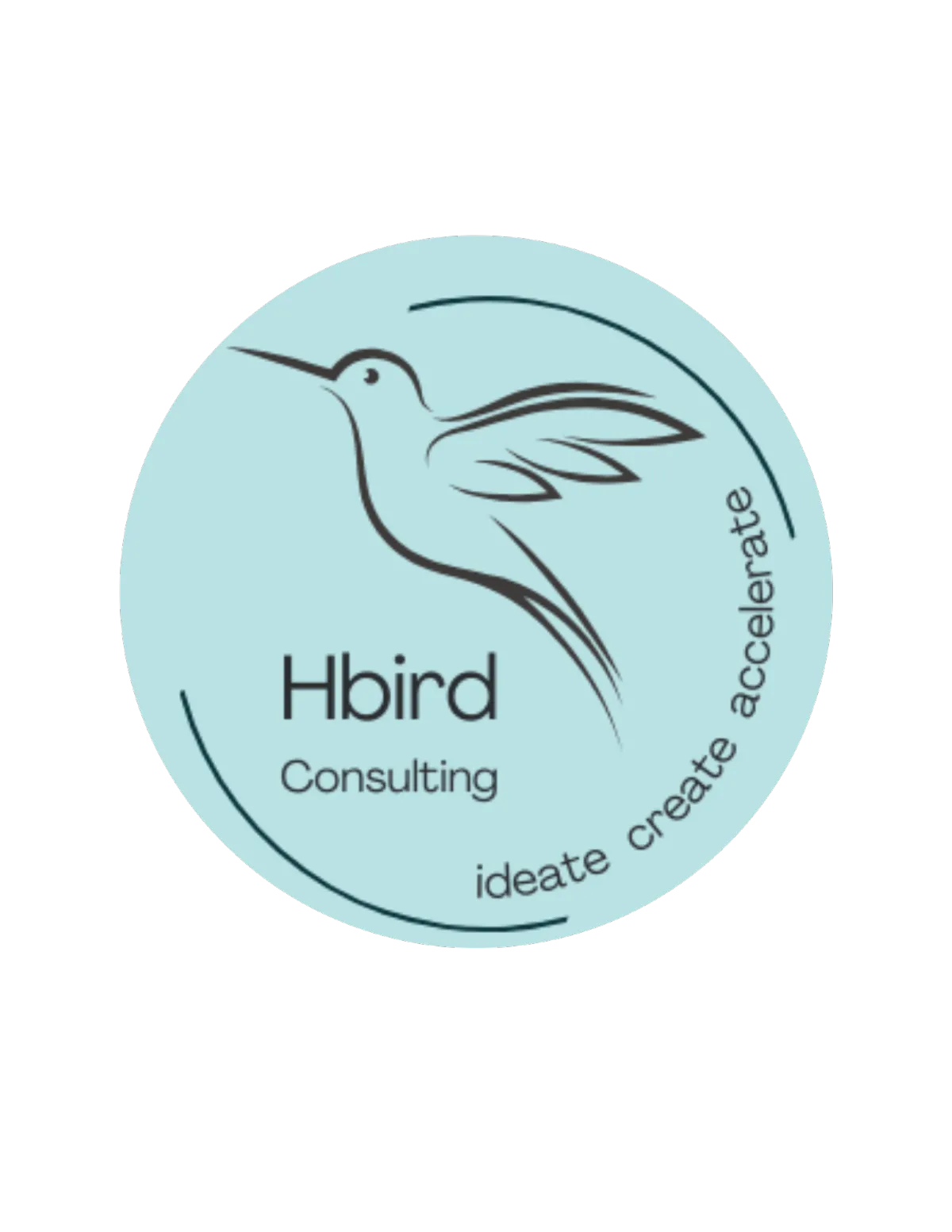
Unbound is a sub brand of Hbird Consulting LLC
Looking to start a business or accelerate an existing one? Hbird Consulting offers Vision to Launch coaching and business development support. Check us out at hbirdco.com
Trusted By
Amie's support is personally and professionally empowering. Her services helped me overcome challenges and limiting blocks, moving forward with confidence and clarity in my work and life."

Samantha Berwick
Founder at Embodied Arts Healing
Business Consulting
The Unbound program gave me the frame work I needed to rapidly evolove and transform into the leader and change-maker I came here to be. The program helped me find a balance beteen structure and flow and allowed me the courage
to lean on my network more than ever.

Tracy Tarlow
Founder at Springboard Connectivity
Non-Profit

